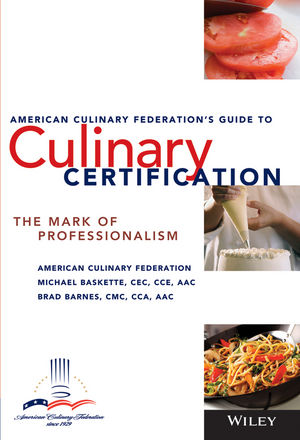|
Textbook
The American Culinary Federation's Guide to Culinary Certification: The Mark of ProfessionalismISBN: 978-0-471-72339-4
Paperback
144 pages
August 2005, ©2006
 This is a Print-on-Demand title. It will be printed specifically to fill your order. Please allow an additional 10-15 days delivery time. The book is not returnable.
|
||||||
Foreword from the Series Editor vii
Preface ix
1 The History of ACF Certification 1
Setting the Bar for Professional Development 2
Gaining Distinction 4
The New Professional Chef 6
The Future of the Culinary Profession 7
2 The Significance of ACF Certification 9
Building the ACF Certification Ladder 10
Climbing the Rungs of the ACF Ladder 11
What ACF Certification Means to the Marketplace 14
3 The ACF Validation Process:Meeting Measurable Objectives 17
How the ACF Certification Program Works 18
Background of ACF Development 19
Setting Measurable Objectives 21
Measuring Performance Objectives 22
Conclusion 27
4 Laying a Foundation in Learning 29
Classical Cuisines Set the Standard 30
Presenting the Classics for Certification 31
Cross-Training in Culinary Fundamentals 33
Progressive Learning 41
Continuing Education 42
Conclusion 43
5 Planning a Career Path in Foodservice 45
Considering the Possibilities 46
Staying the Course 48
Conclusion 52
6 Documenting Your Experience 55
The Proof Is in the Documentation 55
Organizing, Protecting, and Storing Documentation 57
Conclusion 57
7 Levels of ACF Certification 59
ACF Levels of Achievement 60
Conclusion 70
8 The ACF Written Test: Strategies in Learning 71
Who Takes the ACF Certified Exams? 72
Who Administers the Tests? 73
The Exam Matrix 73
Reference Materials 74
Study to Achieve Success 78
9 Evaluating Cooking Skills: The Premise behind the Practical Exam 81
Mind-set for Success 82
Understanding the Role of the Evaluators 83
Conclusion 85
10 Taking the Show on the Road: More on the Practical Testing Process 87
Preparing to Prepare 88
Addressing the Subsets of the Cooking Practical 93
Conclusion 101
11 The Application Process 105
Application Basics 106
Completing the Application Process 114
12 Achieving the Ultimate Goal: Certified Master Chef 121
Details of the CMC Test 123
Conclusion 125
Index 127



